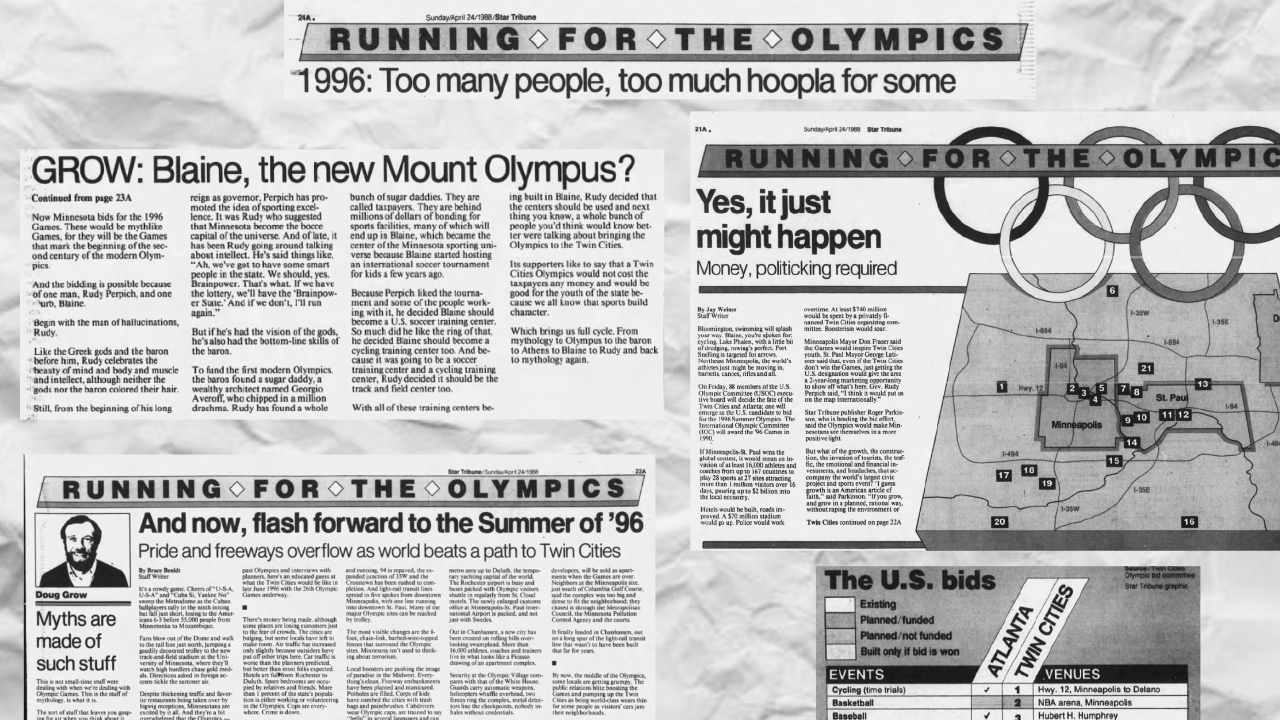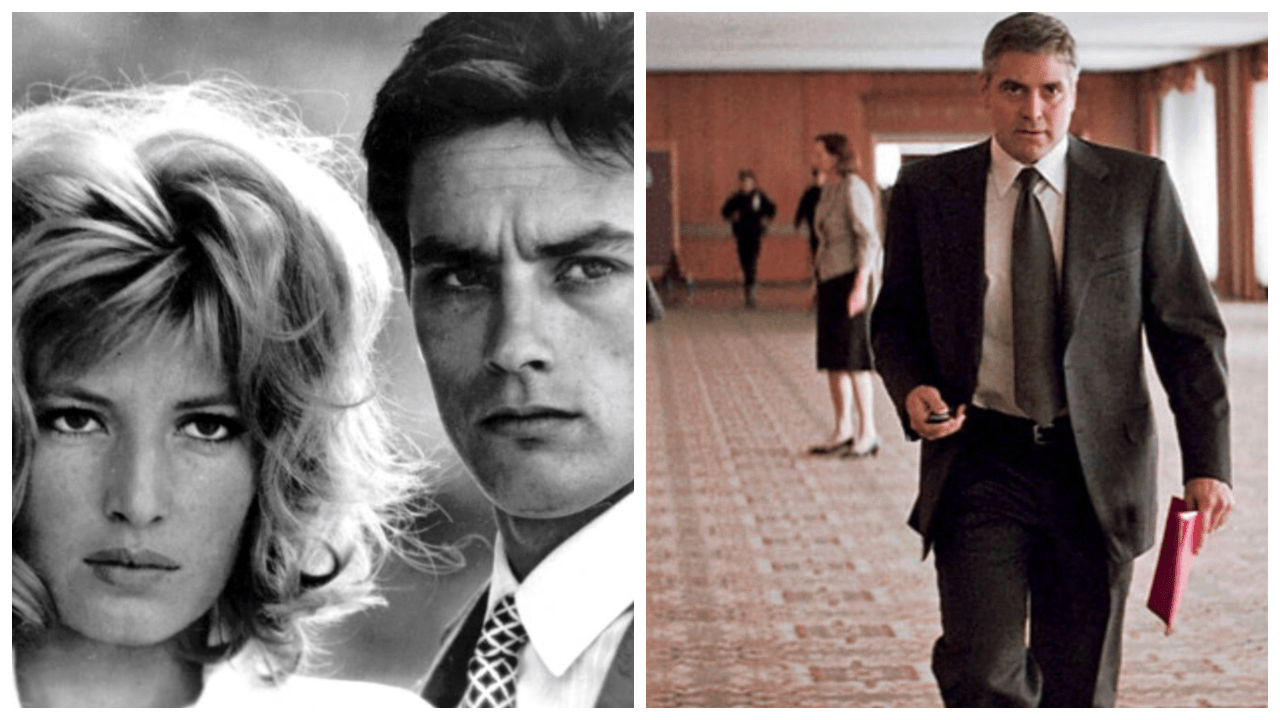Take a moment and think back to the 1996 Olympics. What do you remember?
It might be Muhammad Ali, his body trembling as he lights the cauldron. Or Kerri Strug, on one leg, stoically saluting the judges. Perhaps it’s the Olympic debuts of beach volleyball, softball, and women’s soccer. Or, on a darker note, maybe it’s the pipe bomb that killed one reveler and injured more than a hundred more.
Now imagine those taking place in Dinkytown, the St. Paul Civic Center, and the Metrodome. (We’ll skip the terrorism for the rest of this exercise.)
The 1996 Olympics were in Atlanta, of course. But what if they had been in Minneapolis?
Sounds like a crazy idea, right? And it probably was. But Minneapolis actually has a long history of bidding for the Olympics, and perhaps never was it closer to getting the world’s biggest sporting event than in 1996.
Hosting the Games
Almost no one locally has experienced as many Olympics as Jay Weiner. A longtime sportswriter with the Star Tribune, he covered every Games—Summer or Winter—from 1984 to 2006, then added two more after leaving the paper. (His longtime colleague/Olympics reporting partner, Rachel Blount, was “heartbroken” that the paper didn’t send her to Paris this year.)
“Today it would absolutely be absurd and a waste of money and a waste of time” for Minneapolis to bid for the Olympics, Weiner tells Racket.
But in the late 1980s?
“It was legit,” Weiner says.
First held in 1896 in Athens, the modern Olympics have enjoyed periods of great relevance but also some very real threats of extinction. And in the early 1980s, the movement was in a bad way. Terrorism overshadowed Munich’s attempt at a postwar reintroduction in 1972, then Montreal went into serious debt to host in 1976. Major boycotts in ’76, ’80, and ’84 undercut the global nature of the Games.
Though we now look back at Los Angeles’ highly successful 1984 Olympics as a turning point, when the Games morphed into the commercialized juggernaut we know today, the event was still much humbler and more amateur in nature just a few years later when the U.S. Olympic Committee put out a call for potential 1996 hosts.
And for people like Minnesota Gov. Rudy Perpich and Strib publisher Roger Parkinson, this presented an opportunity.
Thinking Big
Dynastic Minneapolis Lakers aside, Minnesota, it's generally agreed, became a "major league" state when the Twins and Vikings arrived in 1961. Yet more than a decade earlier, in 1948, Minneapolis was already making a serious push to get the Summer Olympics.
The International Olympic Committee ultimately gave the nod to London for its first postwar Summer Games, and it spurned Minneapolis’ efforts again in 1952 and 1956. (Minneapolis also tried for what would have been the third-ever Winter Games in 1932; so did, remarkably, Duluth.)
Minneapolis clearly had global aspirations, a mantle that was picked up in the 1980s by Perpich, the DFL governor reelected in 1986. His investments in amateur sports helped Minneapolis secure the 1990 U.S. Olympic Festival, an Olympics-like event for domestic athletes. The early 1990s also brought us the National Sports Center in Blaine, the Mall of America in Bloomington, and a Super Bowl at the Metrodome in Minneapolis.
Why not add an Olympics too?
Parkinson, the ambitious Star Tribune publisher/president, signed on to lead the bid. Six major players in the business world stepped up with cash. And Perpich put all his weight behind the effort.
“This will put us on the map internationally,” Perpich told the Star Tribune. “I can’t think of anything that would do more for the state than the Olympics.”1
A Twin Cities Olympics
So, what would a Minneapolis Olympics have looked like in 1996?
First, even though it’s referred to as a Minneapolis bid, the plan really encompassed the entire Twin Cities, with sports spread throughout the metro and sailing events in Duluth. Fans could have watched archery at Fort Snelling, gymnastics at the St. Paul Civic Center, boxing at the Met Center, and road cycling along Hwy. 12 from Minneapolis to Delano.
Among the 27 planned venues, all but one either already existed or was in the process of being developed. New venues included an NBA arena in Minneapolis, an aquatics center at Normandale Community College in Bloomington, a cycling velodrome in Blaine, and field hockey at the speed skating oval in Roseville.
Alas, the one missing venue was a big one: a stadium that could house track and field, soccer, and the opening and closing ceremonies. Organizers considered Blaine but ultimately proposed a site roughly where Huntington Bank Stadium sits now for a $70 million open-air stadium that with temporary seating could fit 70,000 fans. (The Metrodome, completed just six years earlier for $55 million, apparently wasn’t a fit, though it was slated to host baseball.)
Other key questions remained. The athletes’ village was pegged for northeast Minneapolis, near the Columbia Golf Club, with organizers planning for 1,500 units that would be sold off as condos or senior housing after the Games—or perhaps something else, if the housing market couldn’t absorb it. St. Paul’s Lake Phalen, the would-be site of canoe and rowing events, needed further dredging to create enough space at the south end for boats to safely finish.
There were also concerns about a shortage of hotel rooms and a lack of public transportation, though city officials were promising a light rail line up and running in time for the Games. Private financing to the tune of $740 million would fund the effort, but cities would be on the hook for costs like increased police presence.
The Vote
Nashville and San Francisco also put their names in for 1996. Ultimately, the choice came down to the Twin Cities and Atlanta. The cities made their case to the USOC executive board on April 29, 1988, at the Hilton in Washington, D.C.
Going into vote, Atlanta—behind its charismatic and well-connected mayor, Andrew Young—was selling itself as a bigger, more international city with more hotel rooms, better transit, and experience hosting major conventions. A Minnesota delegation including Perpich emphasized their bid’s milder weather, compact footprint, dedicated venues for each sport and, notably, the state’s strong tradition of nurturing amateur athletics.
“There was a certain level of seriousness that we felt it could happen,” Weiner says now. Looking back, however, he acknowledges the mood might have been a little too optimistic. The first sign of trouble came at the delegation receptions ahead of the vote. The Minnesotans rented out a hotel ballroom: “It was like a modest bar mitzvah,” Weiner said. He recalls guests were served cheese and crackers.
Atlanta, on the other hand, invited guests to a Georgetown mansion, where they were greeted by violin players and mingled with international dignitaries drawn to Young from his former role as U.S. ambassador to the United Nations.
“It was not a bar mitzvah. It was like a royal wedding,” Weiner says. “And that’s when I think we all understood that Atlanta knew how to play the game.”
The final vote, which took place in private, reportedly wasn’t close.
It turns out the local bid’s understated, buttoned-up—dare we say Minnesotan—approach didn’t land compared to Atlanta’s unapologetic lobbying and lavish parties.
Or, as staff writer Bruce Benidt put it the next day’s Star Tribune, the voters “sidestepped the Twin Cities’ avalanche of earnest information to dance with Atlanta’s dash, style and stature.”2
The Legacy
Unlike some other sporting losses, this one didn’t seem to inflict long-term pain into the local psyche. That’s perhaps because any U.S. bid for the 1996 Games faced enormous odds from the start. After all, the Olympics had (kind of) just been here in ’84, and whichever city the USOC picked would then have to beat out four international cities, including a strong effort from Toronto and the sentimental favorite, Athens, at the full IOC election in 1990.
Of course, we all know what happened.
It may be a stretch to say Minneapolis came “close” to hosting the 1996 Olympics. But the Twin Cities had a credible plan, and if Atlanta could shock the world… maybe we could have too?
Weiner doesn’t go quite that far.
“It wasn’t totally outrageous that Minneapolis could have shocked the world,” he says, “until we got to Washington and saw the Atlanta show versus our show, and saw that we were in a whole other league.”
The 1988 vote came at an inflection point in the Olympic movement. The Minnesota delegation appeared taken aback by Atlanta’s bravado and lobbying, with one local official calling for more rules and cost controls after the Washington vote. Instead, host city campaigns grew so expensive, unpopular, and ripe for corruption that in 2019 the IOC finally adopted a new approach: It now essentially handpicks a preferred host city.
“Everybody comes in there promising everything,” Perpich, who died in 1995, said at the USOC vote in Washington. “The follow-through is what’s important, and we’ve been very, very steady on that.”3
Back in 1988, Perpich & Co. focused on the sports infrastructure they’d already invested in here. Thirty-six years later, much of that remains in place or improved upon, and the Twin Cities have retained their reputation as a hotbed for NCAA and international events, including just this year with a cross-country skiing world cup, the men’s Frozen Four, the Olympic trials in gymnastics, and the Paralympic trials in swimming.
So while we didn’t get Muhammad Ali, the “Magnificent Seven,” and a big new stadium at the U, in a roundabout way, we may have ultimately fulfilled that 1996 vision anyway.
Footnotes
- Star Tribune Sun, Apr 24, 1988 ·Page 21Return to content at reference 1↩
- Star Tribune Sat, Apr 30, 1988 ·Page 6Return to content at reference 2↩
- Star Tribune Sat, Apr 30, 1988 ·Page 6Return to content at reference 3↩






